An Unstoppable Movement - Strengthening Global Solidarity for Abortion Rights
‘We must not lose hope, it is important that we do not stop engaging with the anti-choicers. We must continue to take small steps [to strengthen access to safe abortion care], repeatedly. They create windows of opportunities for change.’
- Dr Simon Peter Kayondo, OBGYN, Association of Obstetricians and Gynaecologists of Uganda (AOGU)
In this FIGO Long Read, we look back at the global solidarity event that took place at Paris City Hall on 11 October 2023 to claim access and defend the right to abortion care.
(Image above from left to right - Alice Ackermann, Justyna Wydrzyńska, Dr Simon Peter Kayondo, Dephine O, Cecile Wendnonga Thiombiano/ Yougbaré, Dr Guillermo Ortiz)
Leveraging the energy of the International Federation of Gynecology and Obstetrics’ (FIGO) global congress - where more that 8,000 delegates from 116 countries had gathered, FIGO, together with its partners, Amnesty International, FIGO, IPAS, Médecins du Monde, Le Planning Familial, EquiPop organised a global solidarity event at City Hall, Paris. Alice Ackermann, Chair, in her opening remarks set the scene of the importance of international solidarity for abortion (to work within, across borders and with different stakeholders), the need for sharing of lessons and strategies and resources (human and financial) to continue the struggle to both claim access and defend the right to abortion care.
The gathering centred on inspiring personal insights from diverse speakers – health care providers, human rights advocates and government representatives, who shared their courageous commitment, despite the challenges, to defend, destigmatise and strengthen access to safe abortion care.
‘I, myself, have had an abortion,’ shared Kim Chiusano, City Hall, Deputy as part of her opening welcome works, which embraced the fact that abortion is common. Chiusano, reaffirmed that abortion care is essential health care as she reflected on the recent roll-backs in the USA, and shared that France was in the process of aiming to constitutionalise abortion care, so that it is available and accessible for all those that require it.
We must not lose hope
Dr Guillermo Ortiz, from El Salvador, gave a powerful personal testimony highlighting the harm that criminalising abortion laws have for health care providers in addition to denial the fundamental rights of women and girls.
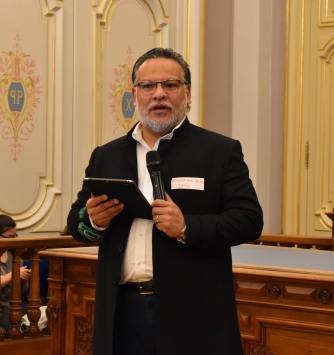
‘I am first and foremost an OBGYN. I chose to become a doctor out of a desire to help those in need, and to be someone who eventually can make a difference between health and sickness, between life and death.
I was the head of obstetrics at the largest maternity hospital in El Salvador, a country that has one of the most restrictive abortion laws in the world. Since 1998 abortion has been banned under all circumstances, regardless of whether the mother’s life is at risk, the fetus is viable, or the pregnancy is a result of rape or incest.
Over the more than 20 years I worked as an OBGYN; I saw time and time again women who needed treatment for health problems during pregnancy and these treatments were denied because they were “pregnant.”
I saw how the law affected their health outcomes—a law that didn’t respect their rights as women. I saw these women’s health deteriorate and I watched as some died. The defining moment for me—when I became an outspoken advocate for abortion—was in 2013, when I met a young woman called Beatriz.
Beatriz was 22 years old and pregnant with her second child. She was admitted at the hospital for having a health’s crisis and her three-month pre-natal exam showed the fetus was missing parts of its brain and head. It had no chance of survival. Beatriz was also ill, she was suffering from lupus and kidney problems, and the pregnancy was causing her health to decline rapidly. The day after she was given the results, Beatriz came to me and asked me to end the pregnancy because she was afraid to die, something which almost happened in her first pregnancy. It was at this moment that I knew I could not watch another woman die because of the law.
My decision to ask for permission to perform an abortion on Beatriz catapulted me to the epicenter of the abortion debate in El Salvador. Beatriz’s case made its way through the hospital administration, the lower courts and finally to the Supreme Court of Justice, El Salvador’s highest court. Although the court ruled in the government’s favour, the judges wrote that doctors could medically intervene to keep the child and patient alive.
After the court’s ruling, I performed a “mini” cesarean section on Beatriz. I removed the seven-month-old baby and placed it in an incubator, where it died a few hours later.
When I stepped out of the operation room I didn’t know if the police would be waiting outside to arrest me and take me to prison. Fortunately, that did not happen.
I knew performing this late-term abortion was the right—and most ethical—decision to make, however it came with consequences for myself and my family. I became a target for anti-rights opposition advocates and fearing for my life, I left the country.
This should not be the case for doctors performing abortions. Our duty is to protect the health and lives of women—especially the most vulnerable.
After leaving El Salvador, I came to work for Ipas in the USA. This is when I began my work as an abortion advocate in earnest, advocating for the repeal of abortion bans in El Salvador and in other Latin American countries.
In 2022, I testified in a case before the Inter-American Court on Human Rights, the highest judicial human rights body in Latin America, concerning Manuela, who had suffered an obstetric emergency. She was accused by the El Salvador government of having an abortion, imprisoned and died while serving a 30-year sentence.
The court ruled that El Salvador must take action to reform its punitive reproductive health and rights policies. This ruling was a victory for human rights.
Earlier this year, I once again stood before the Inter-American court in the case of Beatriz v. El Salvador. As Beatriz’s attending physician, I was there to testify that the country’s abortion ban prevented me from offering her an abortion, even though she had a high-risk pregnancy because of her health issues.
The court is expected to issue a ruling by the end of the year, if they rule against El Salvador this case could expand access to abortion across Latin America. It would mean justice for Beatriz.
It is inspiring to stand here with you and know that we are united in making sure people everywhere can access abortion services. We all have a role in shaping the future of women’s reproductive autonomy.
We can work together to improve abortion access, to ensure that women have the autonomy to make decisions about their body. Together, we can make a difference because abortion is health care.’
Way forward: end the deafening silence of unsafe abortions
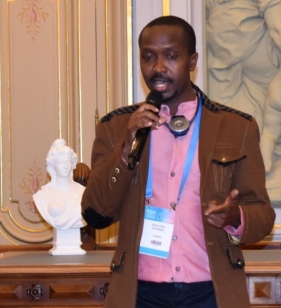
Dr Simon Peter Kayondo is a OBGYN member of the Association of Obstetricians and Gynaecologists of Uganda working on FIGO’s Advocating for Safe Abortion Project. He reaffirmed the importance of health care workings speaking up on the essential need for abortion care.
‘No one wants to speak about access to safe abortion care. Yet, we know women and girls die and become disabled from complications related to unsafe abortion. It is critical health care providers speak-up on.
As healthcare workers, we must focus on what we can do. It takes time to change the law, but in Uganda we have focused on changing attitudes of healthcare workers by doing value clarification trainings, we must not lose hope that they work. At one of our trainings we had an OBGYN who was opposed to abortion care, but after a few months after one of the trainings, he got in touch with me and asked me about the correct dosage for the administration of abortion tablets. Therefore, it is important that we do not stop engaging with the anti-choicers. We must continue to take small steps, repeatedly. It creates windows of opportunities for change. Windows to inform government policies and programmes to improve access to abortion care as essential health care.’
Silver lining: abortion alliance building
Justyna Wydrzyńska, a health advocate from Poland, has been supporting women who sought an abortion for 17 years. Six months ago she was found guilty by a Polish court for supporting a survivor of domestic violence, Ania who sought an abortion during the Covid pandemic.
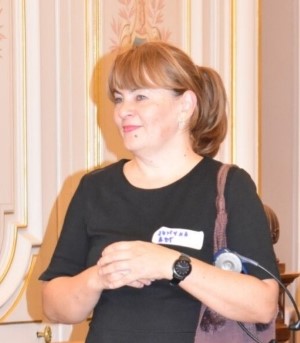
‘I was convicted for sending my own set of abortion pills to Ania, but she did not use them because her abusive partner reported her to the police, who came to her house and took the pills. This is how we got caught.
The trial was a farce, a legal harassment, orchestrated by the state of Poland. I think the goal was to try to exhaust me and my activist colleagues through draining our resources - our time, our money, our mental and emotional energy. I got assigned obligatory community service as penalty. Ironically, I feel like I am doing community service to reduce harms of Polish state for the last 17 years.
Now we are waiting for the appeal court. I am grateful to FIGO for providing its clinical evidence to the court, and for its continued support on her case.
The situation in Poland on restricted abortion access is not unique, and I feel, it is my responsibility to call for total decriminalisation of abortion.
If there is any silver lining, it is the fact that the efforts we and you put go beyond my case. The support and the alliances we mobilised, the doors we opened, are for the future protection of all women helping other women in abortions, and all the activists who may soon face prosecution for providing abortions.’
The right to legal abortion must be depoliticised
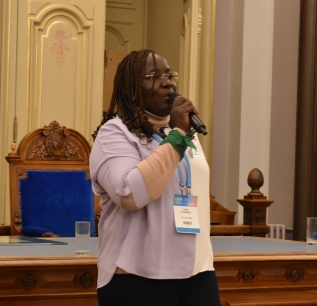
Cécile Wendnonga Thiombiano/ Yougbaré, Sexual Reproductive Health and Rights Advocacy Adviser for Africa, Médecins du Monde & Association of Women Lawyers in Burkina Faso, reminded the audience that while access to abortion care may be denied, there can be no denial that women and girls, do in fact, have the legal right to abortion.
‘The legal framework that sets the right to abortion as a binding legal obligation is often rejected and not accepted. Yet the Maputo Protocol – Article 14.2-C [sets the right to abortion] was indeed written, adopted, by the free and consensual will of African Heads of States.’
Contrary to popular belief, the abortion movement does not only suffer from official opposition (social, religious constraints, etc.), it also faces challenges in accessing funding.
Funding for abortion must be strengthened for the benefit of local organisations and all pro-choice organisations. The principle of localisation of the aid in question. Aid must be depoliticized: for example, the Sahel countries and feminist organizations are suffering a funding blockade, and are therefore doubly impacted by this other financial opposition. I urged the French Ambassador to “Speak loudly" and she urged the ‘France government to assert its leadership and its Feminist policy, by financing civil society, those also experiencing the Sahel crisis, by strengthening the technical capacities of feminist associations.
Abortion solidarity needed in all quarters
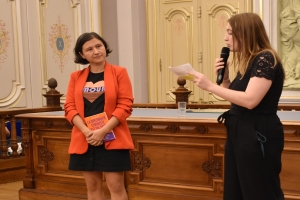
Delphine O- Ambassador-at-large, French government and Secretary General for the Generation Equality at the French Ministry of Foreign Affairs stressed the need for abortion advocates to ‘Speak loud and be clear on access to safe abortion being a fundamental right – and this needs to be repeated over and over again.’
She reminded us that this year marks the 75 anniversary of Universal Declaration of Human Rights (UDHR) - which includes the right to health.
The event was a testament to Eleanor Roosevelt, founding architect of the UDHR who stated ‘where, after all, do universal human rights begin? In small places, close to home—so close and so small that they cannot be seen on any maps of the world. Yet they are the world of the individual person; the neighbourhood [s]/he lives in...; such are the places where every man, woman, and child seeks equal justice, equal opportunity, equal dignity without discrimination. Unless these rights have meaning there, they have little meaning anywhere. Without concerted citizen action to uphold them close to home, we shall look in vain for progress in the larger world’